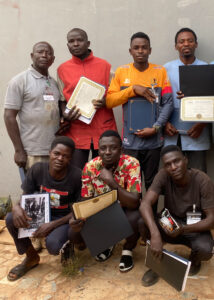To Smile or Not to Smile

By Jaime Saint
Over the last few years, ITEC has conducted numerous trainings in Africa. I have led many of these trips. At the end of every training, there is a graduation ceremony where we give a certificate to all trainees who successfully complete the training with proficiency. Often the graduation is held during a church service so that everyone in the local church can celebrate with the trainees. But one thing has never made sense. Recently, as I was reflecting on a dental training trip to East Africa, I looked at the graduation picture with all the trainers and trainees. The trip was a huge success as all the trainees demonstrated proficiency and had each extracted more than 20 teeth during the week of training. As all the trainers gathered in the front to join the trainees, the trainers were all smiling but, as I looked at the picture, I noticed that not a single trainee was smiling.
A few months later, David, our lead mechanical trainer, and I were invited to an indigenous missionary conference in West Africa. The conference was hosted by a partner that we have worked with for several years, and there were over 8,000 indigenous missionaries in attendance. David and I were the only two from outside of the country where the conference was being held. Anytime we stepped outside the building, we were mobbed by people asking for a "snap," which, we found out was a picture. They were laughing and talking with big smiles until the moment came for their picture to be taken. At that moment, the smiles left their face. In every picture, David and I were the only two smiling.
On day five of the conference, there was a graduation ceremony for the host's Bible institute and several of the trade school classes they lead. In every picture, that we were asked to join, nobody was smiling. It did not make sense. Many of these students had spent years studying to be missionaries, and at this moment they were being honored and celebrated as they had finished their training. After the ceremony, I asked our hosts why no one smiled in pictures, and finally, it made sense.
A picture is viewed as a serious thing. So, in a picture, if you are smiling, you are not taking the picture seriously. My eyes were opened. I had considered myself fairly culturally versed, having lived in Ecuador and Mali years earlier, as well as having traveled to many countries around the world over the last decade. But even with all that cross-cultural experience, the lack of smiles in pictures had never made sense.
As I have shared this a few times, it confirms that the best people to share the Gospel in an unreached people group are those Christ followers who are closest in proximity to them.
On day five of the conference, there was a graduation ceremony for the host's Bible institute and several of the trade school classes they lead. In every picture, that we were asked to join, nobody was smiling. It did not make sense. Many of these students had spent years studying to be missionaries, and at this moment they were being honored and celebrated as they had finished their training. After the ceremony, I asked our hosts why no one smiled in pictures, and finally, it made sense.
A picture is viewed as a serious thing. So, in a picture, if you are smiling, you are not taking the picture seriously. My eyes were opened. I had considered myself fairly culturally versed, having lived in Ecuador and Mali years earlier, as well as having traveled to many countries around the world over the last decade. But even with all that cross-cultural experience, the lack of smiles in pictures had never made sense.
As I have shared this a few times, it confirms that the best people to share the Gospel in an unreached people group are those Christ followers who are closest in proximity to them.
Give Where Needed Most

